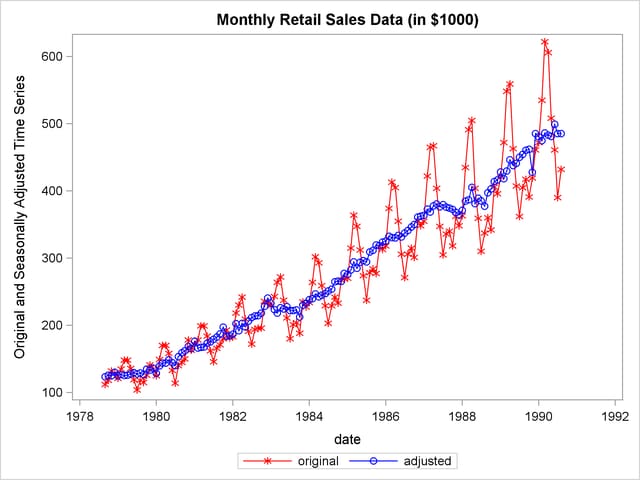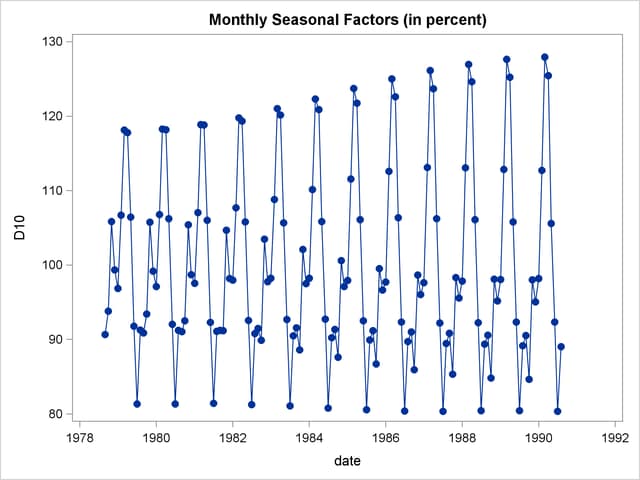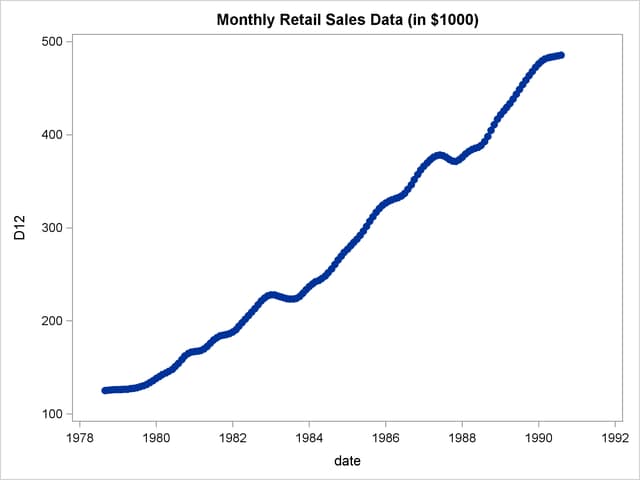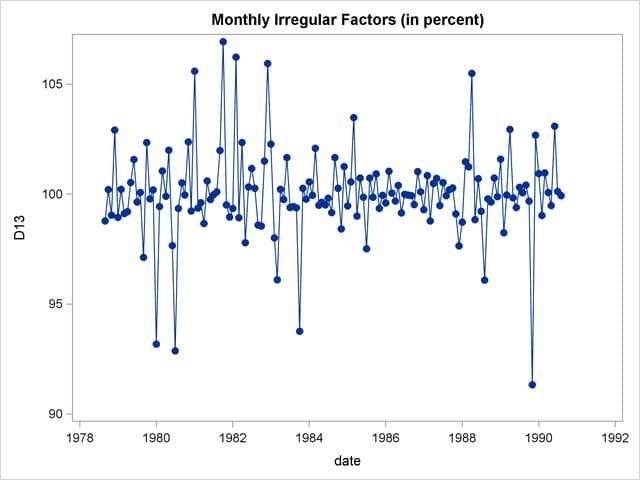The X11 Procedure
- Overview
-
Getting Started

-
Syntax

-
Details
 Historical Development of X-11 Implementation of the X-11 Seasonal Adjustment Method Computational Details for Sliding Spans Analysis Data Requirements Missing Values Prior Daily Weights and Trading-Day Regression Adjustment for Prior Factors The YRAHEADOUT Option Effect of Backcast and Forecast Length Details of Model Selection OUT= Data Set The OUTSPAN= Data Set OUTSTB= Data Set OUTTDR= Data Set Printed Output ODS Table Names
Historical Development of X-11 Implementation of the X-11 Seasonal Adjustment Method Computational Details for Sliding Spans Analysis Data Requirements Missing Values Prior Daily Weights and Trading-Day Regression Adjustment for Prior Factors The YRAHEADOUT Option Effect of Backcast and Forecast Length Details of Model Selection OUT= Data Set The OUTSPAN= Data Set OUTSTB= Data Set OUTTDR= Data Set Printed Output ODS Table Names -
Examples

- References
Example 36.1 Component Estimation—Monthly Data
This example computes and plots the final estimates of the individual components for a monthly series. In the first plot (Output 36.1.1), an overlaid plot of the original and seasonally adjusted data is produced. The trend in the data is more evident in the seasonally adjusted data than in the original data. This trend is even more clear in Output 36.1.3, the plot of Table D12, the trend cycle. Note that both the seasonal factors and the irregular factors vary around 100, while the trend cycle and the seasonally adjusted data are in the scale of the original data.
From Output 36.1.2 the seasonal component appears to be slowly increasing, while no apparent pattern exists for the irregular series in Output 36.1.4.
data sales; input sales @@; date = intnx( 'month', '01sep1978'd, _n_-1 ); format date monyy7.; datalines; ... more lines ...
proc x11 data=sales noprint;
monthly date=date;
var sales;
tables b1 d11;
output out=out b1=series d10=d10 d11=d11
d12=d12 d13=d13;
run;
title 'Monthly Retail Sales Data (in $1000)';
proc sgplot data=out;
series x=date y=series / markers
markerattrs=(color=red symbol='asterisk')
lineattrs=(color=red)
legendlabel="original" ;
series x=date y=d11 / markers
markerattrs=(color=blue symbol='circle')
lineattrs=(color=blue)
legendlabel="adjusted" ;
yaxis label='Original and Seasonally Adjusted Time Series';
run;
Output 36.1.1
Plots of Original and Seasonally Adjusted Data

title 'Monthly Seasonal Factors (in percent)'; proc sgplot data=out; series x=date y=d10 / markers markerattrs=(symbol=CircleFilled) ; run;
title 'Monthly Retail Sales Data (in $1000)'; proc sgplot data=out; series x=date y=d12 / markers markerattrs=(symbol=CircleFilled) ; run;
title 'Monthly Irregular Factors (in percent)'; proc sgplot data=out; series x=date y=d13 / markers markerattrs=(symbol=CircleFilled) ; run;
Output 36.1.2
Plot of D10, the Final Seasonal Factors

Output 36.1.3
Plot of D12, the Final Trend Cycle

Output 36.1.4
Plot of D13, the Final Irregular Series
